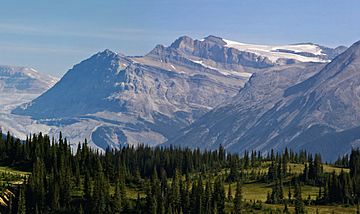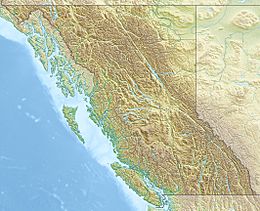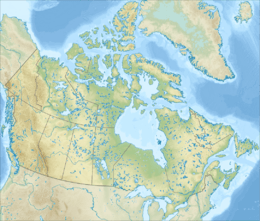Mount Gordon (Canada) facts for kids
Quick facts for kids Mount Gordon |
|
|---|---|

Mount Gordon seen from Iceline Trail
|
|
| Highest point | |
| Elevation | 3,161 m (10,371 ft) |
| Prominence | 471 m (1,545 ft) |
| Listing | Mountains of British Columbia |
| Geography | |
| Location | Yoho National Park British Columbia, Canada |
| Parent range | Waputik Range Canadian Rockies |
| Topo map | NTS 82N/10 |
| Geology | |
| Age of rock | Cambrian |
| Type of rock | Sedimentary |
| Climbing | |
| First ascent | 1897 G. Baker, J.N. Collie, H.B. Dixon, C.E. Fay, A. Michael, C.L. Noyes, H.C. Parker, C.S. Thompson, P.Sarbach |
Mount Gordon is a tall mountain in the Canadian Rockies in British Columbia, Canada. It stands 3,161 meters (about 10,371 feet) high. This impressive peak is found in Yoho National Park, just west of the Continental Divide.
Mount Gordon is a glaciated dome, meaning it has a rounded top covered in ice. It is also the highest point of the Wapta Icefield, a large area of glaciers. The closest higher mountain is Mount Baker, which is about 8.8 kilometers (5.5 miles) away to the northwest.
Mountain's Story
The first people to climb Mount Gordon reached its summit in August 1897. This climbing group included George Percival Baker, J. Norman Collie, H. B. Dixon, Charles Ernest Fay, Arthur Michael, C. L. Noyes, H. C. Parker, and Charles Sproull Thompson. They were guided by Peter Sarbach.
The mountain was named in 1897 by Charles Sproull Thompson, one of the first climbers. He named it after John Hamilton-Gordon, 1st Marquess of Aberdeen and Temair. At that time, John Hamilton-Gordon was the Governor General of Canada, who represented the King or Queen in Canada.
After climbing Mount Gordon, Thompson had a scary moment. He fell into a deep crack in the ice called a crevasse. His team had to rescue him. Another mountain, Mount Thompson, which is about six kilometers north of Mount Gordon, was also named by this same climbing group. The name "Mount Gordon" was officially recognized in 1924 by the Geographical Names Board of Canada.
Rocks and How They Formed
Mount Gordon is made of sedimentary rock. This type of rock forms from layers of sand, mud, and tiny bits of plants and animals that settle at the bottom of ancient seas. Over millions of years, these layers get squished and hardened into rock.
The rocks of Mount Gordon were laid down during the Precambrian and Jurassic periods, which were very long ago. Later, during a time called the Laramide orogeny, huge forces pushed these rocks up. This movement caused the older sedimentary layers to slide over younger rocks, forming the mountains we see today.
Weather Around the Mountain
Mount Gordon is in a subarctic climate zone. This means it has very cold winters with lots of snow and mild summers. Temperatures can drop below −20 °C (which is −4 °F). With the wind, it can feel even colder, sometimes below −30 °C (which is −22 °F).



